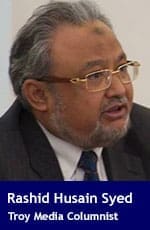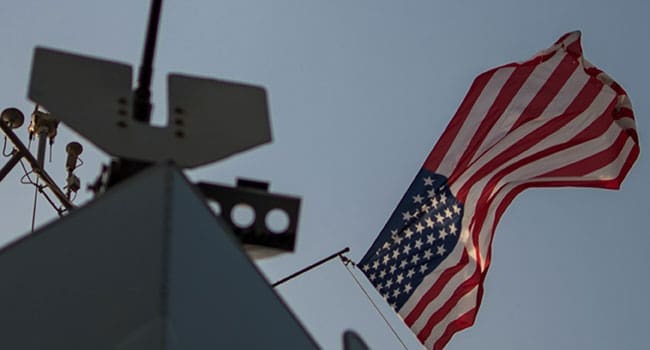 United States President Donald Trump leaves office in three weeks. Anything could happen before then.
United States President Donald Trump leaves office in three weeks. Anything could happen before then.
Stakeholders are taking positions around the strategically-important Strait of Hormuz, the only sea passage for crude oil shipped from the Persian Gulf to the open ocean. In 2018, some 21 million barrels per day (bpd), or almost 20 percent of the total global crude consumption, passed through it.
Sandwiched between Oman and Iran, the strait is also one of the world’s most strategic chokepoints. Just 34 km wide at its narrowest point, the shipping lane is only three km wide in either direction.
Incoming vessels are forced to use the north and east routes to access the Persian Gulf, so they need to pass through Iranian waters, providing Iran with the capacity to disrupt traffic using the straits.
On Dec. 20, rockets were fired on the American embassy in Baghdad. The U.S. blamed Iran. In the wake of the attacks, the U.S. announced that the USS Georgia passed through the Strait of Hormuz to demonstrate America’s “ability to sail and operate wherever international law allows.”
Persian Gulf region badly needs economic liberalization by Miguel Cervantes and Tanja Porčnik
A day later, the USS John S. McCain “asserted navigational rights and freedoms in the Spratly Islands, consistent with international law,” the United States announced.
Iran has also been expanding its military footprint, building key infrastructure in the area. The American Enterprise Institute’s Nicholas Carl reports that Iran has been adapting its force posture, structure and capabilities to meet any eventuality.
Last June, Iranian President Hassan Rouhani announced plans to construct a 1,000-km oil pipeline from Bushehr province to Bandar-e Jask by March 2021, to allow Iran to export oil even if the strait “was closed.” Iran exports around 90 percent of its oil from Bushehr province via the strait.
Other regional oil-exporting countries are looking at similar possibilities. The Abu Dhabi crude oil pipeline has a capacity of 1.5 million bpd and carries the bulk of its production to the United Arab Emirates port of Fujairah on the Indian Ocean.
In order to bypass the strait, the U.A.E. is reportedly looking to use the Israeli Eilat-Ashkelon pipeline, built by Israel and Iran in the 1960s. This pipeline has a capacity of 600,000 bpd and runs from the Red Sea to the Mediterranean.
In the wake of rising tension, Saudi Arabia’s Red Sea crude terminals have taken on critical importance. Saudi Arabia already exports some of its oil, using a 1,200-km pipeline that runs from its key production facilities in the east to the Red Sea port city of Yanbu in the west. A major expansion of its capacity is also underway.
Unconfirmed media reports also indicate that Saudi Aramco has been using a separate reserve network of other pipelines running parallel to its east-west pipeline.
Departing U.S. Energy Secretary Dan Brouillette last week met with ministers from the U.A.E., Bahrain and Israel, and hinted at the possibility of using alternative methods to transport Middle East oil and gas to the world.
“Part of the conversation we’re having with the Abraham Accords [which marked the first normalization of relations between an Arab country and Israel since that of Egypt in 1979 and Jordan in 1994] is to look for alternatives to shipping, so that’s why these pipelines are so important,” Brouillette told CNBC’s Hadley Gamble.
Yet, to be fair, pipelines are no guarantee of a safe route for crude from the region. Recent attacks from Yemen on Saudi crude infrastructure and the Iranian threat to the U.A.E. in retaliation to any possible attack from Israel underline the reality that the only guarantee of the safe passage of crude from the energy-rich region is the resolution of disputes through negotiations.
Strong-arms tactics may not work and the United States needs to understand that, fully and comprehensively.
Toronto-based Rashid Husain Syed is a respected energy and political analyst. The Middle East is his area of focus. As well as writing for major local and global newspapers, Rashid is also a regular speaker at major international conferences. He has been asked to provide his perspective on global energy issues by both the Department of Energy in Washington and the International Energy Agency in Paris.
For interview requests, click here. You must be a Troy Media Marketplace media subscriber to access our Sourcebook.
The views, opinions and positions expressed by columnists and contributors are the author’s alone. They do not inherently or expressly reflect the views, opinions and/or positions of our publication.


